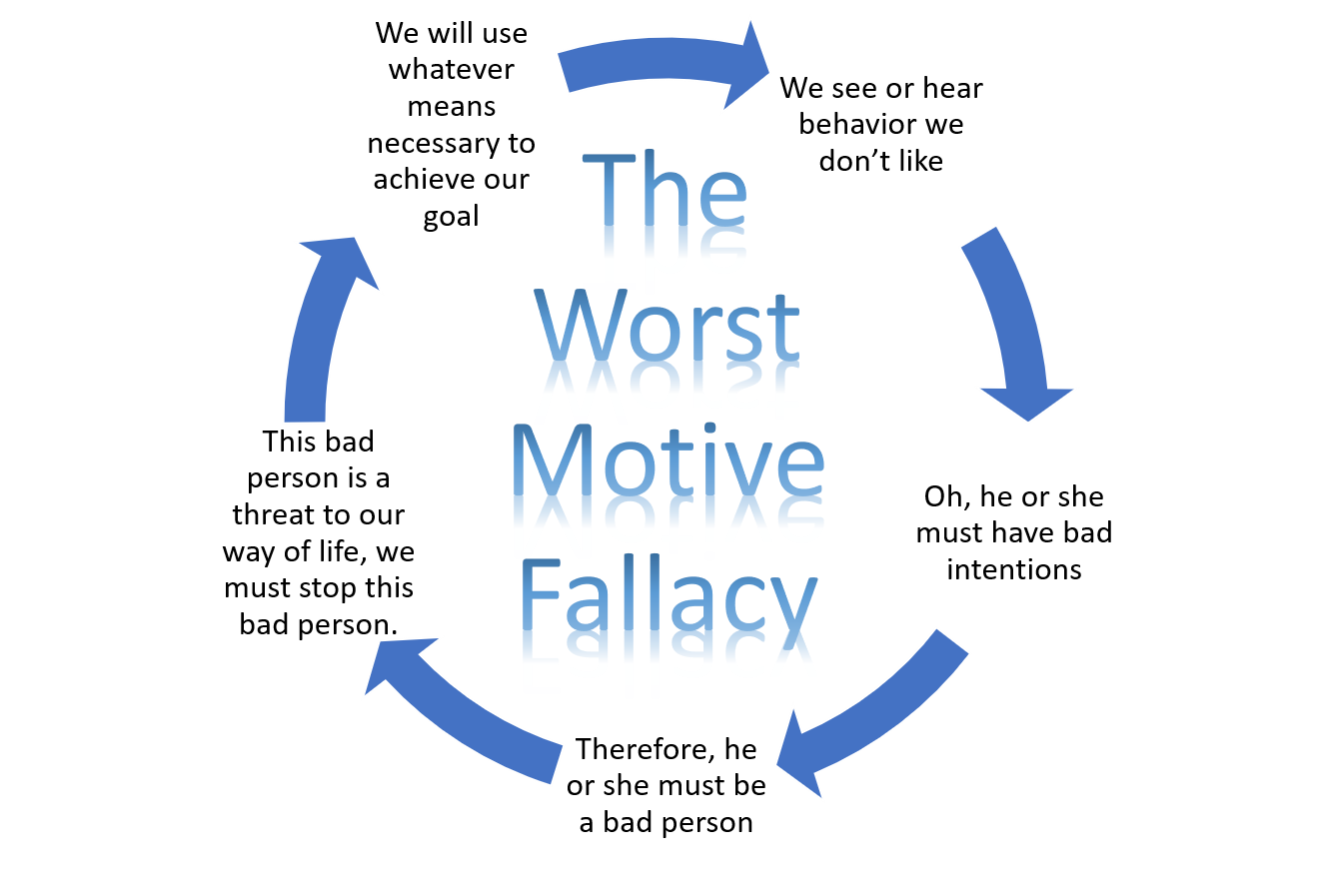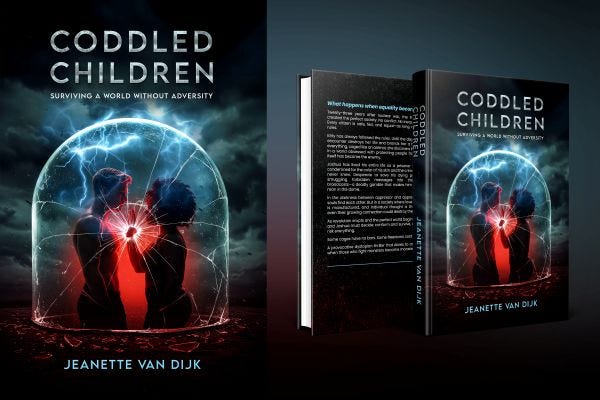Two Perspectives, One Reality: Why Hirsi Ali and Mearsheimer Are Both Right
The Worst Motive Fallacy in Action
A while back I wrote an article about the Worst Motive Fallacy: how we attribute bad intentions to behavior or speech we disagree with. It happens most often with topics close to our hearts, where criticism can feel personal. We stop seeing the person behind the reasoning. We can no longer hear the arguments being made. Instead, it becomes our personal responsibility to stop the other person, who is obviously wrong.
Last week, Ayaan Hirsi Ali published an article that illustrated this fallacy perfectly. Rather than engaging with John J. Mearsheimer’s actual arguments about American foreign policy, she painted him as fundamentally "anti-American" and suggested his theories helped create the chaos that allowed ISIS to build their brutal caliphate. That's quite a serious allegation towards a university professor who's simply trying to understand how power works in the international system.
Before we continue, I want to emphasize that I have tremendous respect for both Ayaan Hirsi Ali and John Mearsheimer. Both are brilliant thinkers who bring valuable insights from their unique perspectives and life experiences. Hirsi Ali's courage in speaking truth about radical Islam and women's rights, despite personal threats, is admirable. Mearsheimer's rigorous analysis of power dynamics and the unintended consequences of military intervention has shaped how many understand geopolitics.
But here's the thing: none of us are perfect. None of us have the complete picture. That's exactly why we must listen to each other, especially when we disagree. It's all too easy to lose ourselves in rigid positions and forget that behind every argument there's a human being trying to make sense of a complex world.
The Worst Motive Fallacy
The worst motive fallacy is a cognitive trap that catches us all. We confuse someone's character with their arguments. Because we disagree with what they're saying, we assume they must be a bad person with malicious intent. And once we've decided someone is fundamentally untrustworthy, we feel justified in using any means necessary to discredit them.
You can spot this fallacy when the discussion shifts from "is this analysis correct" to "can we trust this person's motives?" There's little factual engagement, just character assassination.
Hirsi Ali's article demonstrates this perfectly. Instead of examining Mearsheimer's arguments about American foreign policy, she questions his loyalty to his country and labels him "the anti-American academic who helped build the caliphate," treating his scholarly analysis as if it were an act of treason.
There is a bit of irony here. Hirsi Ali herself has been subjected to exactly this treatment throughout her career, dismissed as an "Islamophobe" or “Neoconservative puppet” rather than having her arguments about extremism addressed on their merits.
When the worst motive fallacy is at play, we all become demons.
What Mearsheimer Actually Argues
Mearsheimer's "offensive realism" theory is both uncomfortable and undeniable: American foreign interventions, whatever their stated noble goals, have consistently served American interests first and caused massive collateral damage in the process.
His theory simply acknowledges what the historical record shows. Great powers don't sacrifice blood and treasure for abstract ideals—they pursue their interests, and the rhetoric about democracy and human rights often serves as window dressing. When American policymakers speak of "protecting democracy" or "defending human rights," what they actually mean is they're protecting American hegemony and defending its strategic interests.
The facts prove him right. Since World War II, the US has launched nearly 400 military interventions, bombed over thirty countries, and initiated countless regime changes. Entire regions have been destabilized, creating massive refugee flows into the West. Many intervention targets became failed states that harbor terrorism. The track record shows few clear victories and enormous collateral damage.
Mearsheimer's solution of "offshore balancing" calls for America to step back from direct military intervention and let regional powers manage their own affairs. Instead of maintaining massive military footprints around the world, America would act more like Britain did in the 19th century: powerful enough to intervene when truly necessary, but generally letting others handle regional conflicts.
Being honest about how the US has projected power globally is not anti-American sentiment: it's a different perspective on how America can maintain its position while avoiding the costs and blowback of constant intervention, or paying a terrible price when a bigger rival finally arises.
Where Hirsi Ali Has a Point
But Hirsi Ali, who grew up in Islamic culture, does point out a big flaw in Mearsheimer's realism theory: it reasons entirely from Western assumptions about what constitutes rational behavior. His framework assumes all actors think like Western states, that they weigh costs and benefits through an economic and military lens, that they can be deterred by conventional power balances, that cultural and religious considerations are secondary to material interests, as we enlightened westerners have come to believe.
For someone raised in Islamic culture, this Western-centric worldview reveals itself as a dangerous blind spot. In many Islamic societies, honor, faith, and historical grievance often trump economic calculation. Religious obligation can override material self-interest. Agreements with "infidels" may be seen as temporary conveniences rather than binding commitments. What looks irrational to Western eyes may be perfectly logical within a different value system.
Cultural and religious influences in Islamic societies carry far more weight than Mearsheimer's materialist framework suggests. When she points out that alliances with non-Muslims remain conditional, i.e that we will always be “infidels,” she's highlighting a reality that shapes geopolitical behavior just as much as Mearsheimer's realism theory does.
Where Hirsi Ali Falls Short
Hirsi Ali's approach reveals several intellectual blind spots that undermine her own stated commitment to free inquiry. By questioning Mearsheimer's motives rather than addressing his arguments, she undermines the principle of open intellectual debate that democratic societies depend on. When criticism of foreign policy is being interpreted as an attack on patriotism, we're no longer having an academic discussion but have moved on to ideological conquest.
There's no question that US hegemony has been very successful for the Western hemisphere. Western Europe has been liberated from the Nazis by the Americans. Through the Marshall Plan, whatever its interests, Western Europe has been able to rebuild much faster than if they would have done on their own. And the security provided by the US since World War II has lifted Western Europe to unprecedented levels of prosperity. Western Europe has a lot to be thankful for. We would not be where we are today if not for US hegemony. That is a simple fact.
However, the core of US hegemony has always been intervention and military conquest. Globalization through economic pressure rather than honest partnership has shaped US policy for decades. Many of our current global challenges, such as refugee crises, failed states and terrorist networks, stem directly from interventions that prioritized American interests over local stability. Acknowledging both American contributions and American costs isn't contradictory; it's simply recognizing that geopolitics involves trade-offs where the West profited and the rest of the world paid a terrible price.
We too have a responsibility here that cannot be shunned.
Why We Need Both Voices
This is an AI-generated video using the ‘hug my love’ feature in Filmora Wondershare. This has not happened in real life as far as I know, but one can always hope!
What I've tried to show here is that we need diversity of thought: we need different perspectives. From my point of view, Mearsheimer and Hirsi Ali are actually perfect intellectual partners who should be combining their insights to create better analysis, not bicker about who is right and who is anti-American.
Mearsheimer's cold analysis shows how American interventions create chaos and instability, but he struggles to explain why some regions resist Western solutions more persistently than others. Hirsi Ali knows exactly why: because honor, faith, and historical grievance often override economic calculations in many societies. She understands the cultural dynamics that his academic models miss, while his empirical data reveals patterns that her personal experience might overlook.
Put them together and you get something neither achieves alone: a realistic assessment of both American overreach AND the deeper reasons why certain interventions fail so spectacularly. His materialist framework plus her cultural insights equals actual understanding of how the world works.
This is what we need more than anything else today: the intellectual humility to recognize that complex problems require multiple perspectives. We may disagree about solutions, but we need to rebuild our capacity for shared understanding of reality itself. And we can only do that if we're prepared to listen to each other, especially when we don't like what we hear.
For a full understanding of what the worst motive fallacy is all about, I’ve included my original article here:
Speaking of uncomfortable truths that challenge mainstream narratives... If you enjoyed this analysis, you'll appreciate Coddled Children—a dystopian thriller that explores what happens when independent thought becomes dangerous. Available now on Amazon. Buy it here!




